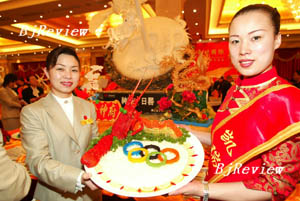
Cuisine and sports are the twin passions of 36-year-old Beijing chef Li Jingze's life. Although he feels frustrated by the failures of China's national football team in international games, Li remains a loyal fan of the football team of Beijing in the Chinese Super League and rarely misses the opportunity to cheer when it plays host. Like millions of Chinese men, Li Jingze often wakes up at midnight to watch games of foreign leagues and the World Cup.
Recently, more than 500 Western cuisine restaurants and 100 catering suppliers in Beijing jointly launched a cooking contest. The prize-winning chefs will win a place in the pool of Olympic culinary talents.
Li Jingze, who is good at Chinese and Western cuisine, is bracing himself for the results. "Without Beijing's successful bid for the Olympics, I could never think of using my craft to serve the grand sports gala." He said the competition involving so many talented chefs would be stiff.
The Beijing Organizing Committee for the Games of the 29th Olympiad (BOCOG) has announced that the cuisine offered in the Olympic village during the Olympics will be mainly Western and the proportion between Western and Chinese dishes will be kept at seven to three.
"This decision has been controversial and Chinese chefs hope athletes and foreign guests will take this opportunity to sample more pure Chinese delicacies, including desserts and snacks," Li Jingze said.
"An exhibition on Chinese cuisine will be open throughout the Olympics in the Olympic village, to showcase China's culinary culture," said Xu Yunfei of the China Cuisine Association.
Li Jingze is not very confident of winning. "At least I participated in the contest," he said. "Moreover, my efforts will still be meaningful if the Chinese spectators at the 2008 Olympics come to my restaurants to taste my specialties."
This October, Li Jingze went on an eye-opening trip to Xi'an in western China for the Second China Catering Expo. The most impressive part of the exhibition was the recommended menus for the 2008 Olympics.
Li said the dishes were displayed to reflect a sports theme. The altogether 180 dishes were selected from more than 1,800 chefs nationwide, covering a wide array of Western, Chinese and vegetarian food and desserts. Besides the color, smell and taste, the dishes were out through a check by nutritionists to make sure they satisfied athletes' nutritional demands.
It has been estimated by BOCOG that throughout the Olympics in August 2008, the Olympic village will see a peak population of 17,000 people and a permanent population of at least 10,000 people; the larger of the two media villages will house 6,000 people. They will require round-the-clock catering services for 30 days in a row.
"The menus for each meal during the Olympics will be worked out in detail beforehand and every day will have a distinctive menu," said Xu Yunfei. He said the International Olympic Committee would have to approve every menu before it is confirmed as an Olympic menu. Every dish will come with a quality card, certifying that it has been made as per the pre-determined procedures.
The recipes for the strongest, fastest and tallest people on earth are already generating much enthusiasm. "There is not much difference in the ingredients used; only that professional nutritionists' suggestions have been taken into account in preparing the food," said Shen Dan, a nutritionist with international certification. She said that despite the different dietary habits among athletes from different countries, the recipes must all contain enough sugar, fat and protein. She said in Western countries, where sports nutrition starts early, it was common for a professional athlete to have his or her own sports nutritionist who would decide what foods the athlete could eat during and between games.
Shen Dan said the calories in Olympic recipes would be much higher than those in ordinary menus so as to sustain physical recovery after intense exercise and competition. "Compared with ordinary people, athletes' diets feature a higher proportion of carbohydrates and proteins and a lower proportion of fat. In a balanced diet for athletes, calories from carbohydrate, protein and fat should be respectively 70 percent, 15 percent and less than 20 percent of the total."
Food safety remains a top concern. Chinese and foreign experts on the food safety panel of the BOCOG have put forward a comprehensive action plan on food safety, according to which experts will be stationed in the kitchen to supervise the preparation of food.
| 